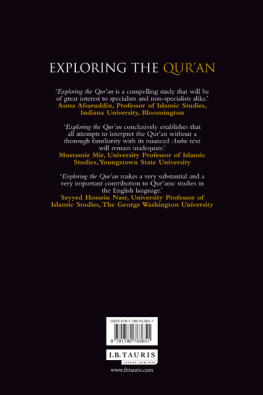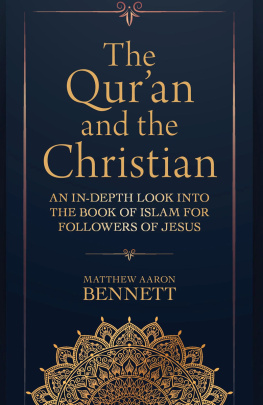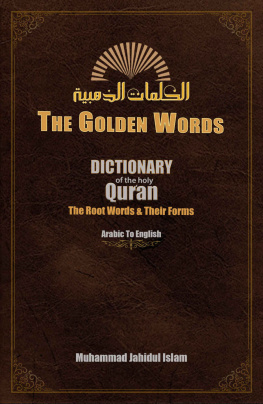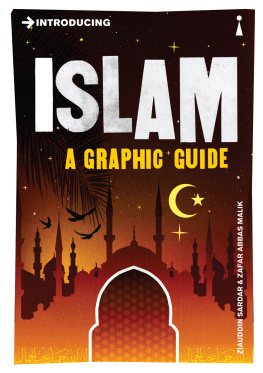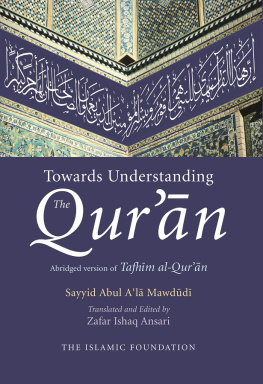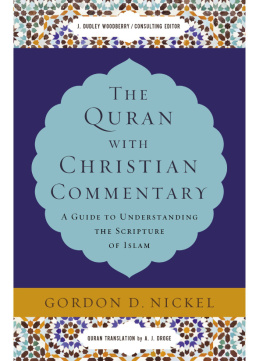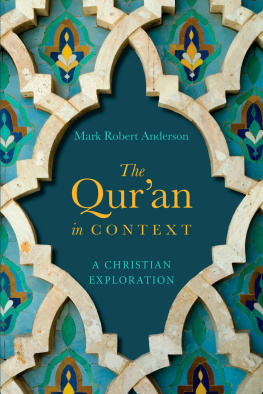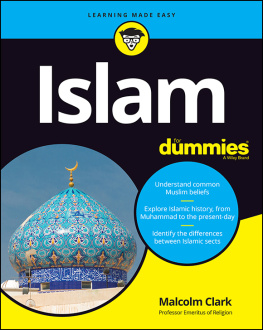Muhammad Abdel Haleem is King Fahd Professor of Islamic Studies at the School of Oriental and African Studies, University of London. His major new English translation of the Quran, with parallel Arabic text, was published in 2010.

This new edition published and reprinted in 2011 by I.B.Tauris & Co Ltd
6 Salem Road, London W2 4BU
175 Fifth Avenue, New York NY 10010
www.ibtauris.com
Distributed in the United States and Canada Exclusively by Palgrave Macmillan
175 Fifth Avenue, New York NY 10010
Paperback edition first published in 2001 by I.B.Tauris & Co Ltd
First published in 1999 by I.B.Tauris & Co Ltd in the London Quran Studies series
Copyright 1999, 2001, 2011 Muhammad Abdel Haleem
The right of Muhammad Abdel Haleem to be identified as the author of this work has been asserted by him in accordance with the Copyright, Designs and Patent Act 1988.
All rights reserved. Except for brief quotations in a review, this book, or any part thereof, may not be reproduced, stored in or introduced into a retrieval system, or transmitted, in any form or by any means, electronic, mechanical, photocopying, recording or otherwise, without the prior written permission of the publisher.
ISBN: 978 1 84511 789 4
eISBN: 978 0 85773 037 4
A full CIP record for this book is available from the British Library
A full CIP record is available from the Library of Congress
Library of Congress Catalog Card Number: available
Typeset in New Baskerville by Aptara Inc., New Delhi
Preface
Understanding the Quran is intended to help the general reader, and also the scholar, to understand the Muslim scripture by combining a number of approaches: thematic, stylistic and comparative. The 2001 edition sold out and in this edition, apart from basing the quotations on my recent translation of the Quran and adding a short conclusion, the book, including the preface has remained in its original form to represent my views at the time. Any changes will appear in subsequent publications.
The study of themes in the Quran is fairly new in English. This is surprising, as it is a helpful approach that can give a balanced view of what the Quran says on any given topic. In 1976, Falur Ramn observed that there was an urgent need for an introduction to major themes of the Quran, and his book of this title Perennial themes such as war, marriage and tolerance in Islam, are among those which Muslims consider to have been seriously misunderstood by many Western writers, and they feel that the Quran has yet to be explored properly on these themes.
In addition to thematic studies, the book includes a general introduction about the revelation and importance of the Quran in the life of Muslims, and a discussion of its style. Certain fundamental aspects of the style of the Quran need to be explained for the benefit of general readers and scholars alike. Chapter 12 of this book, The Quran Explains Itself, spells out two important methods for understanding the Quran and deals with the assertion that Sra 55 is a mere imitation of biblical material, for example Psalm 136. Chapter 13 shows that a grasp of certain features of Quranic style is essential for a proper understanding. For example, what has been assumed to be bad grammar is in fact a well-established and effective feature of Arabic literary writing.
The comparative approach running through many parts of this book was, in fact, suggested by audiences at public lectures who themselves drew the comparisons between the Bible and the Quran and asked me to talk about them. It is hoped that this book will help bring more understanding of the Quran to readers familiar with the biblical treatment of similar themes. Falur Ramn refers to the tradition of Western scholars who seek to trace the influence of Jewish or Christian ideas on the Quran in order to prove that the Quran is no more than an echo of Judaism (or Christianity) and Muhammad was no more than a Jewish (or Christian) disciple! Unlike such writings, the comparisons in this book seek only to elucidate the Quranic view and approach.
In treating the subjects under discussion, it was felt that the Quran should be left to speak for itself, albeit in translation. Hence numerous quotations have been included.
Some of the material in this book has appeared as articles in different publications, and I would like to thank the publishers for their permission to reprint them.
My most sincere thanks go to my wife for typing and revising the manuscript, and for her invaluable comments.
1
The Quran
Read in the Name of your Lord. These were the first words of the Quran revealed to Muhammad. The revelation came to him during a period of retreat and meditation in a cave outside Mecca in 610 CE . He was already forty years old; he was not known to have had a gift for poetry or rhetoric like many of his contemporaries, or to have engaged in any discussion of religion. His account survives of the extraordinary circumstances of this revelation, of being approached by an angel who commanded him: Read! When he explained that he could not read, the angel squeezed him strongly, repeating the request twice, and then recited to him the first two lines of the Quran in which the concepts of reading, learning/knowing and the pen occur six times (96:15).
The Quran does not begin chronologically like the Old Testament, nor genealogically like the New Testament, but as modern Muslim writers on education point out by directly talking about reading, teaching, knowing and writing. Nor does the beginning of the Quran resemble the beginning of any earlier work known in Arabic literature. Until the first revelation came to him in the cave, Muhammad was not known to have composed any poem or given any speech. The Quran employs this fact in arguing with the unbelievers:
Say, If God had so willed, I would not have recited it to you, nor would He have made it known to you. I lived a whole lifetime among you before it came to me. How can you not use your reason?
10:16
You never recited any Scripture before We revealed this one to you; you never wrote one down with your hand. If you had done so, those who follow falsehood might have had cause to doubt.
29:48
The word qurn lexically means reading and came to refer to the text which is read. The Muslim scripture often calls itself kitb: lexically this means writing and came to refer to the written book. Thus the significance of uttering and writing the revealed scripture is emphasised from the very beginning of Islam, and is locked in the very nouns that designate the Quran.
The first piece of revelation consisted of two lines in Arabic, which began the Quran and the mission of the Prophet, after which he had no further experience of revelation for some while. Then another short piece was revealed, and between then and shortly before the Prophets death in 632 AD at the age of sixty-three, the whole text of the Quran was revealed gradually, piece by piece, in varying lengths, giving new teachings or commenting on events or answering questions according to circumstances. For the first experience of revelation Muhammad was alone in the cave and he reported it. After that the circumstances in which he received revelations were witnessed by others and recorded. Visible, audible and sensory reactions were witnessed by those around the Prophet when he experienced the state of revelation. His face would brighten and he would fall silent and appear as if his thoughts were far away, his body would become heavy as if in sleep, a humming sound would be heard about him, and sweat would appear on his face, even on winter days. This stage would last for a brief period and as it receded he would immediately recite new verses of the Quran. This state was reported clearly not to be the Prophets to command: it would descend on him as he was walking, sitting, riding, or giving a sermon, and there were occasions when he waited anxiously for it for over a month to answer a question he was asked, or comment on an event. The Prophet and his followers understood these signs as the experience accompanying the communication of Quranic verses by the Angel of Revelation (Gabriel). The Prophets adversaries explained it as a sign of his being possessed, or magic. (In this regard, the Quran has itself recorded all claims and attacks made against it and against the Prophet in his lifetime.)
Next page

